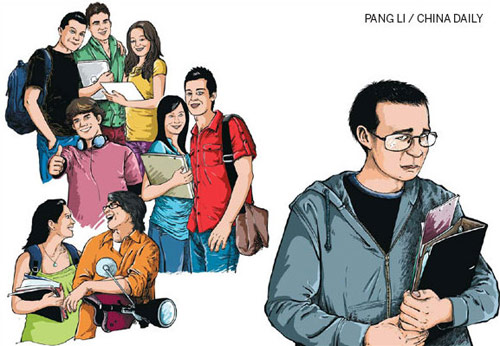Two schools of thought
 |
|
The gap between new college students from the countryside and big cities is inevitable, but not serious, Wang Kaihao finds out in Beijing. |
This summer has been a miracle for Zeng Xing, in Shaoyang, Hunan province.
In the June national college entrance exam (NCEE), his 679 points from a total of 750 won him second place among science students in Hunan, and gave him the opportunity to attend the prestigious Tsinghua University in Beijing.
More than 350,000 students in the province participated in the exam this year and Zeng is the first student in his high school's history to enter Tsinghua.
The local government and the high school authority gave him 15,000 yuan ($2,400) as reward.
His parents, who are migrant workers in Guangdong province, asked for one month of leave to return home and held a 30-table banquet for relatives and neighbors to celebrate.
But after Zeng's first train ride, for 23 hours, to the capital in August, he got lost in Beijing West Railway Station.
"The gap between us and those from big cities is obvious in terms of English language and computer skills," Zeng says.
His English test result in NCEE was almost perfect - 145 out of 150 - but he confesses he does not have many chances to practice other than handling stacks of exam papers.
"And our access to new technology is limited. Except for a few families with college students, no one at our village has computers at home," he says.
Zeng is lucky that a company in his hometown sponsored him a laptop.
Beijinger Huang Weiyu is Zeng's classmate. His NCEE result ranks about 30th in his high school. The family remained calm and did not hold a big celebration.
"They are very warm-hearted and easy-going," says Huang, referring to his new friends from the countryside.
However, differences do exist.
Li Yan comes from Longxi in Gansu province, listed by the State Council as one of the "national poverty counties". She is newly enrolled at Shaanxi Normal University in Xi'an, Shaanxi's provincial capital.
"My classmates from big cities spend a lot of time putting on makeup and little time on sports," she says in a telephone interview.
"I have no idea who the singers are when they talk about music."
Li spends just 7 to 8 yuan on dining every day, which can hardly cover one meal for most of her classmates. She usually orders some rice plus one dish for lunch. "At least I can finish my food. It's a pity many classmates throw away the food after a few bites."
Li also says her female roommates refuse to fetch hot water from the boiler room because they think the exercise might make them look muscled.
Li gets homesick and phones home every day. She is one of 40 freshmen sponsored by a Canadian charity program this year, Educating Girls of Rural China, for poor female college students.
Ma Huiming, also from Longxi, was sponsored in 2008. She continues to study at Tianjin Normal University, after spending four years there.
Ma spoke Mandarin with a strong accent when she first went to college and was teased by her classmates. She was asked to quit the student union after staying there for one month because poor computer skills prevented her from completing some work.
"I knew they didn't have bad intentions, but it was still very tough for me," Ma says.
"The gap between new college students from the countryside and big cities is inevitable when they have different experiences growing up, such as lifestyles and access to information," says Fei Junfeng, a psychology professor from Nanjing University, based in Jiangsu's provincial capital.
"Interpersonal relationships are key. It will usually take three to six months for the students to be assimilated into the new group. The process will take even longer for those who get soaked in academic studies at high school and who lack social skills."
Fei thinks those students attending boarding schools, including Zeng, are usually able to adapt to college life quicker.
"It's unfair to always say it's more difficult for the students from remote areas to get used to college life in the big city," says Cao Hui, a psychological counselor from Nanjing Normal University. "The problem is often on their urban side. They are usually the only children in a family, lack the experience of living in group and ask for more privacy."
Ma says her urban classmates often quarrel about trivial things.
"We, from the countryside, sometimes appear more reasonable," she giggles. "I didn't have any problem getting along with my classmates after my junior year."
Cao says students today are more willing to share their relationship problems with counselors, compared with five years ago.
"However, all the psychological counseling can only be an auxiliary channel, and students should adjust their attitudes and live more positively," Cao says.
Zeng has signed on for several student societies, including guitar club, to be "more open-minded and optimistic".
Meanwhile, Li writes essays to release emotions and for inner peace. "I can find my own way to be entertained. I guess most urban students will lose their capacity to write as they rely too much on multimedia."
"It's a cheering fact based on my counseling that today's college students, no matter from the countryside or urban areas, are generally more mature, less stubborn, and have stronger mental resilience," Cao adds.
"However, it's a pity that the media tend to ignore these shining points. Society has given them too much pressure. We have to be more tolerant toward these young people."
Contact the writer at wangkaihao@chinadaily.com.cn.


















